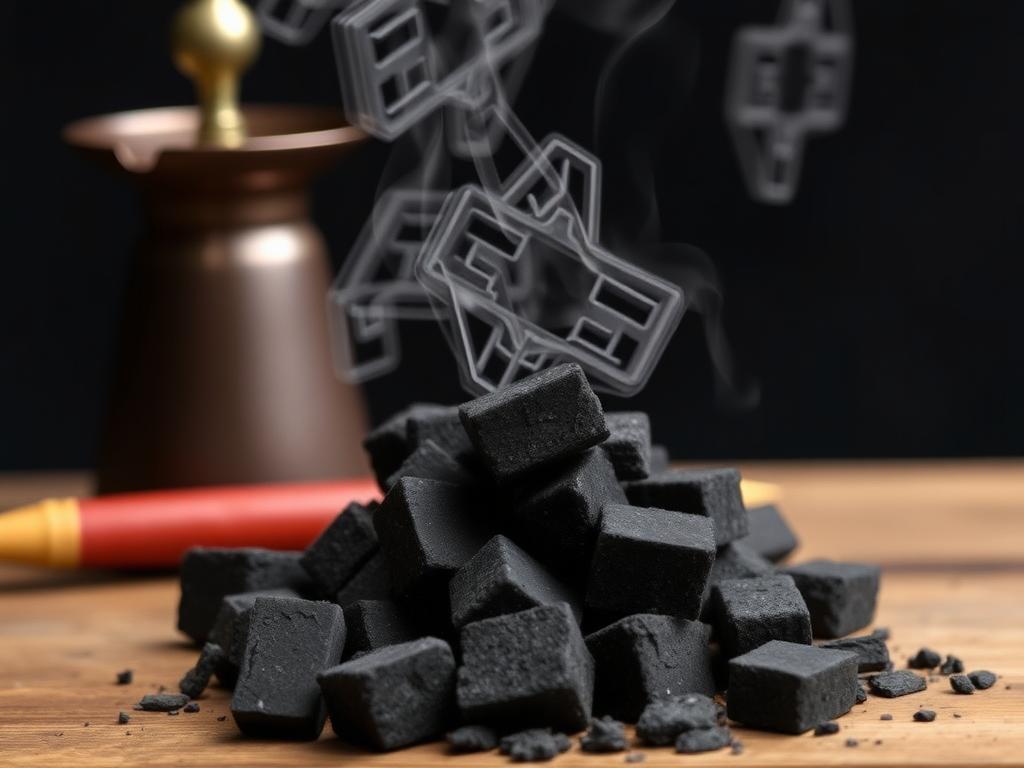Phone:
(86) 189-9829-4887
Email:
[email protected]
Address:
F01-03 Bojun Business Park
Shibi Yicun, Panyu District, Guangzhou, China

Phone:
(86) 189-9829-4887
Email:
[email protected]
Address:
F01-03 Bojun Business Park
Shibi Yicun, Panyu District, Guangzhou, China

When it comes to enjoying a smooth and flavorful hookah session, the type of charcoal you use can make all the difference. This guide delves into the world of hookah charcoal, focusing on the benefits of high-quality options like coconut husk and apple wood water smoke charcoal. Whether you’re a restaurant owner, a cafe manager, or a distributor, understanding the nuances of hookah charcoal can enhance your offerings and satisfy your customers. Read on to discover why this article is essential for anyone in the hookah industry.
Hookah charcoal is a critical component that directly affects the quality of smoke and flavor during a hookah session. Quality charcoal ignites evenly and produces the right amount of heat, ensuring an enjoyable experience. Using inferior charcoal can lead to harsh flavors and an unpleasant smoking experience, which can deter customers from returning.
High-quality hookah charcoal, such as coconut charcoal or apple wood charcoal, burns cleaner and longer, providing consistent heat and flavor. This is particularly important for establishments like restaurants and cafes that aim to provide a premium experience. By investing in quality charcoal, you not only enhance the smoking experience but also build a reputation for excellence.
When it comes to choosing the right type of hookah charcoal, there are several options available, including natural charcoal, quick-light coals, and coconut coals. Each type has its advantages and disadvantages.
Natural charcoal is made from organic materials like coconut shells. This type of charcoal is favored for its clean burn and minimal ash production. It may take longer to light but offers a superior smoking experience.
Quick-light coals are convenient and easy to use, often infused with chemicals to ignite instantly. However, they can impart unwanted flavors to the smoke, making them less desirable for discerning smokers.
Coconut charcoal is particularly popular for its long-lasting burn and consistent heat. It provides a clean flavor that enhances the taste of shisha, making it an excellent choice for both casual smokers and connoisseurs.
Understanding the difference between coconut charcoal and traditional charcoal can help you make informed decisions for your business.
Coconut charcoal burns hotter and longer than traditional wood charcoal, which means it can sustain higher temperatures for extended periods. This allows for a more flavorful and consistent smoke.
Coconut charcoal is often seen as a more environmentally friendly option. It is made from coconut shells, a byproduct of the coconut industry, reducing waste and promoting sustainability.
Lighting your hookah coals correctly is crucial to achieving the ideal smoking experience. Here’s how to do it effectively:
Always use hookah tongs to handle hot coals, and avoid direct contact with skin to prevent burns.
Heat is a vital element in the hookah smoking process. The right amount of heat enhances the flavor and ensures a smooth draw.
Effective heat management involves knowing when to add or remove coals to maintain a consistent smoking temperature. Overheating can lead to harsh smoke, while too little heat can result in weak, flavorless sessions.
Selecting the appropriate charcoal depends on several factors, including the type of shisha you use and your customers’ preferences.
Using hookah tongs is essential for handling hot coals safely. Here are some tips:
Regular maintenance of your hookah, including using quality charcoal, can significantly enhance the smoking experience.
Avoiding common pitfalls can improve your hookah experience. Here are a few mistakes to watch out for:
Using too many coals or not managing them properly can lead to an overheated bowl, resulting in harsh smoke.
Failing to remove excess ash can insulate the coals and reduce heat, affecting the overall experience.
The best type of charcoal for hookah is generally considered to be coconut charcoal due to its clean burn and long-lasting heat.
You can light your hookah coals safely using an electric burner. Always use hookah tongs to handle hot coals.
Heat management is crucial as it directly affects the flavor and smoothness of the smoke.
While you can use quick-light coals for convenience, they may impart unwanted flavors compared to natural options like coconut charcoal.
It’s recommended to clean your hookah after every use to maintain flavor and hygiene.
If your hookah is producing weak smoke, check for ash build-up, ensure your coals are hot enough, and verify that your bowl is packed correctly.
For more information about our products, visit Hookah Carbon and explore our range of charcoal for hookah, charcoal hookah, and the best options for your smoking needs!